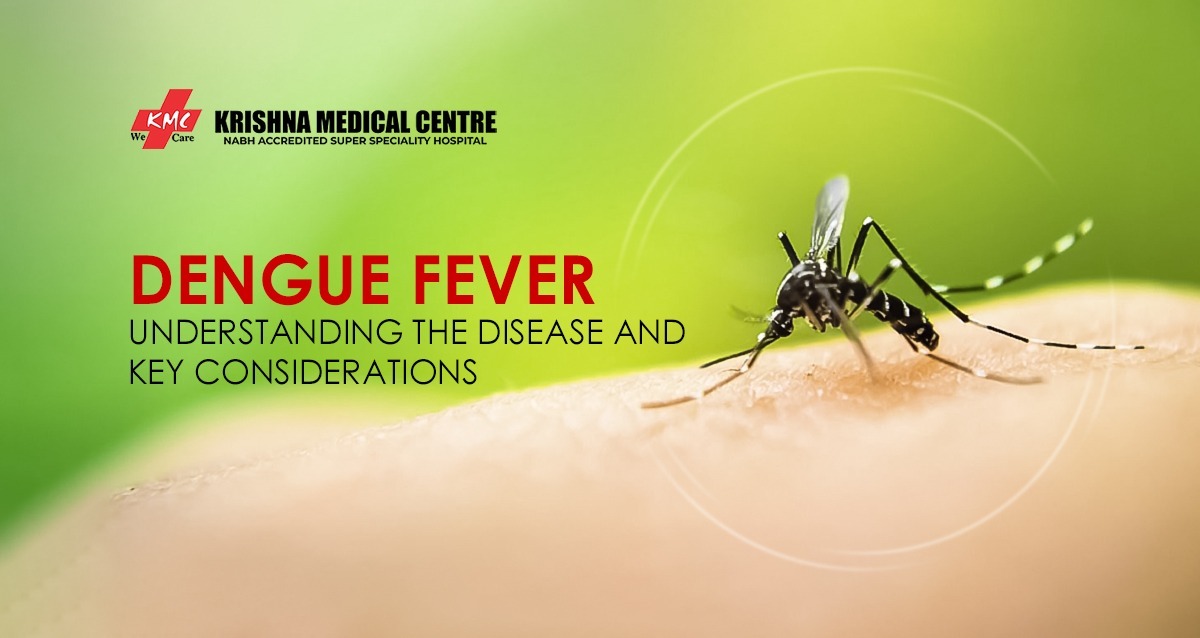Dengue fever is a mosquito-borne viral disease that is currently on the rise and has affected millions of people in India. Due to this sudden rise in dengue cases, understanding the basics of this disease is essential for early detection and regulated care. Dr. Siddhant Khanna – an expert in inward medicine at Krishna Medical Centre in Dehradun gives important insights into dengue fever and what you truly need to review whether you or a companion or relative are affected.
Fever is Your Friend, Not Your Foe
One of the main symptoms of dengue fever is a high fever. It’s essential to see that fever is your body’s natural response to infection which is why when you have a fever, your immune system begins to actively fight it. Dr. Siddhant Khanna advises that you should not panic if you experience a high fever.
Stay Hydrated and Opt for Paracetamol
While experiencing a fever, remaining hydrated by polishing off something like 2 liters of fluids on a day-to-day basis is fundamental. Being hydrated helps your body in fighting the infection and manage the fever effectively. Dr. Siddhant Khanna recommends taking paracetamol to reduce fever along with supportive treatments like antacids and anti-allergics as needed.
Platelet Count Doesn’t Always Determine Severity
Contrary to popular belief, the severity of dengue fever is not solely determined by platelet counts. Platelets are tiny blood cells that play an important role in coagulation. Dr. Siddhant Khanna emphasizes that a low platelet count should not cause unnecessary alarm and the focus should be on overall well-being and hydration.
Platelet Counts Below 1 Lakh Require Monitoring
If your platelet count falls below 1 lakh, Dr. Siddhant Khanna advises daily monitoring. It’s pivotal to be cautious and look for medical attention if your platelet count plunges under 75,000. This precautionary measure allows for the possibility of urgent platelet transfusion if certain indications arise such as active bleeding or a platelet count below 20,000.
Recurrent Vomiting and Dehydration
Recurrent vomiting is a disrupting aftereffect during dengue fever as it can provoke dehydration. Dehydration can antagonistically influence the consequence of the sickness. Dr. Siddhant Khanna recommends getting admitted to a hospital if you experience recurrent vomiting. Adequate hydration is the best approach to administering dengue fever as a matter of fact.
Avoid Antibiotics
It’s important to note that antibiotics are incapable of producing a beneficial effect against viruses. Therefore, taking antibiotics during dengue fever is not recommended. Dr. Siddhant Khanna strongly advises against the use of antibiotics for dengue fever treatment.
Be Cautious with Typhoid Tests
During a dengue infection, it’s advisable to avoid typhoid tests. These tests can yield false-positive results in endless cases with dengue-positive individuals. Rely on the guidance of a healthcare professional for accurate diagnosis.
Platelet Counts After the Febrile Phase
After the febrile phase of dengue fever is over, it’s common for platelet counts to start falling. Dr. Siddhant Khanna emphasizes that this is a natural part of the disease’s course. There is no medication that can artificially increase platelet counts as the process of falling and then increasing is a pathological aspect of dengue fever.
Past Dengue Infections
Patients who have as of late had dengue fever are at a higher risk of developing a severe form of the disease if they contract it again. Dr. Siddhant Khanna urges individuals with a history of recent dengue infection to exercise caution and seek timely medical attention if needed.
These are some of the basic and important insights by Dr. Siddhant Khanna. Individuals can handle the obstacles of dengue fever more effectively if they follow these essential guidelines and seek proper medical treatment when necessary. Dr. Siddhant Khanna’s expertise at Krishna Medical Centre in Dehradun fills in as a significant resource for those going up against this mosquito-borne illness.
FAQs
What are the symptoms of Dengue?
The most common symptoms of dengue are high fever, headache, body aches and nausea.
Which fruits help to recover from Dengue?
• Kiwi
• Papaya
• Dragon Fruit
• Coconut Water
• Pomegranate
What food should be avoided in Dengue?
• Oily/Fried food
• Spicy food
• Caffeinated beverages
What medicine should be taken in Dengue?
Paracetamol should be taken whereas Antibiotics should be avoided at any cost.
How long does Dengue last?
There’s not a fixed time of how long the Dengue can last. However, with proper and regulated medical attention, the body starts recovering after the 6th day.

